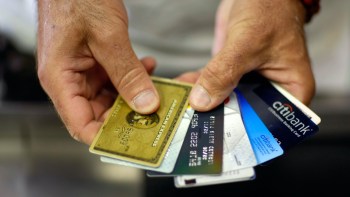Changes in Credit Card 101 for college students
TEXT OF STORY
Tess Vigeland: Aah, to be a college freshman again. All that free time. Pizza whenever you want. Real life… so far away. Heck, I could pull an all-nighter back then and still function the next day. Wish I still could.
Well, add to those new-found freedoms: Being free of credit card marketing. Unlike when I was in college, it’s harder today to get a credit card on your own until you’re 21. New rules in effect this academic year ban card companies from advertising to students.
From WBUR in the big college town of Boston, Curt Nickisch reports how the syllabus for Credit Card 101 has been revised.
Curt Nickisch: You’d think that when your college costs 50 grand a year, you wouldn’t sweat the little stuff.
Rob Kindman: The shopping list includes things like Nutella, ramen and saltines.
Peter Kaplan: It actually includes only Nutella, ramen and saltines.
Jimmy Biblarz: Peanut butter!
Peter: And peanut butter.
Harvard freshmen Peter Kaplan, Jimmy Biblarz and Rob Kindman are making a convenience store run outside their dorm.
Rob: Should we use our credit card?
They spend most of their discretionary dollars here at the commercial Harvard Square. Five bucks here, 10 bucks there is a hazard when there’s an ice cream shop across the street from your dorm room.
These guys are kind of your typical college freshmen. Typical for Harvard at least, where they’re starting out this year. No matter where you go to school, though, one of things you’re supposed to learn is how to live on your own financially. And Jimmy is just getting started.
Jimmy: So I have two sort of credit card-esque things.
He’s still learning the terms.
Jimmy: I guess they call it like a check card, or something. And this I got just a couple weeks ago. It’s actually my parents’ credit card and I’m an authorized user. I checked with my dad last night about what it actually was.
Peter has a debit card only. But Rob has both a debit card and a credit card.
Rob: I got the Visa Platinum. It’s not a big deal.
It’s not a big deal, because his parents are co-signers.
Rob: Since — this is sort of funny — since my parents take care of the credit card, but the debit card is actually my money, the goal is not to use the debit card that much. You gotta use the credit card. It’s about the bottom line, really.
Plastic-by-dad and debit cards are nothing new on campus, but that’s basically all there is now. Under the new rules this year, these under-21-year-olds cannot get a credit card on their own. The new restrictions are meant to keep Jimmy and his roommates from digging the same financial hole that Sally Robinson did, when she was a freshman at the University of Massachusetts.
Sally Robinson: You know, got to campus, and I applied for a card, got a free t-shirt. Applied for another card, got a free water bottle. You know, whatever it was. In the beginning, I was really good and I paid my bills off every month. And then I was like, “I can let this slide for a little bit, for a little bit.” Fifteen cards later, a little bit was a really big number.
About $20,000. The big wakeup call came after graduation, when she applied for a car loan so she could drive to her first job and got denied. Ever since, she’s been trying to pay off that debt.
Robinson: Here it is 10 years later, I’m in my early 30s. I just counted, and of the fifteen cards I had, I still have about six of them that I’m trying to figure out how to pay them off and get rid of them.
So far, it looks like limiting access is working. Interest rates on student cards have fallen more than more than 2 percent compared to other credit cards. That’s a reflection it’s less risky when you have to have a co-signer or documented income.
But there’s a downside. Ben Woolsey, an analyst at CreditCards.com, says while the new rules may protect college kids from bad credit, they also make it harder to build up a good credit record.
Ben Woolsey: Certainly, there’s a subset of college students that could handle credit responsibly, and used that period between the time they’re 18 and 21 to build up a positive credit history. Those people will be, unfortunately, disadvantaged by all this.
It’s not just that card companies aren’t allowed to give students easy credit these days, they increasingly don’t want to. Nessa Feddis of the American Bankers Association says that’s a reflection of the economy.
Nessa Feddis: All the credit card companies are being a bit more cautious, because they’re just coming off of record losses. And it’s not clear who’s going to be the next person who’s going to who loses their job and won’t be able to repay the loan. The caution isn’t so much directed at students. It’s really that it’s part of that group that doesn’t have a good, established credit history.
So for now, card companies aren’t complaining that they’re no longer allowed to market to students on campus — no more booths on the quad pushing card applications. Instead, they’re trying to cultivate these student customers and their business down the road by offering bank accounts with safer debit cards — or credit cards with lower limits. The upshot is that incoming freshman are wading into the consumer credit pool more slowly.
Peter: Yeah, there’s a Chinese restaurant across the street, which has probably been like 50 percent of our expenses so far.
Back at their Harvard dorm room, Peter Kaplan, Jimmy Biblarz and Rob Kindman say they’re fine with not having their own credit cards yet. They don’t buy anything crazy. After all, they know their parents see the bills. But so do they.
Jimmy: Oh crap, I spent 40 bucks today on nothing!
Peter: It makes you feel like an adult, though. Check my transactions and transfer my payments and stuff. Even though my transactions are like four dollars for ice cream or something, but it’s definitely a good transition into adult life.
And everybody needs a transition — even smart guys at Harvard.
In Boston, I’m Curt Nickisch for Marketplace Money.
There’s a lot happening in the world. Through it all, Marketplace is here for you.
You rely on Marketplace to break down the world’s events and tell you how it affects you in a fact-based, approachable way. We rely on your financial support to keep making that possible.
Your donation today powers the independent journalism that you rely on. For just $5/month, you can help sustain Marketplace so we can keep reporting on the things that matter to you.


















